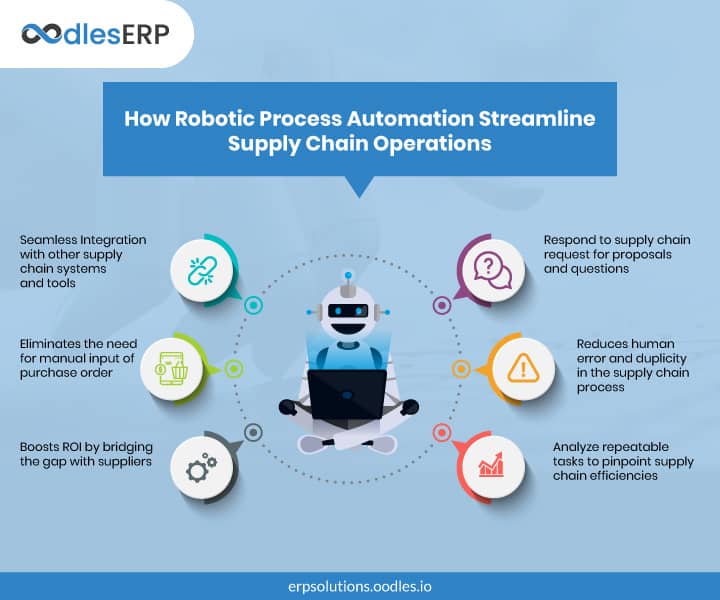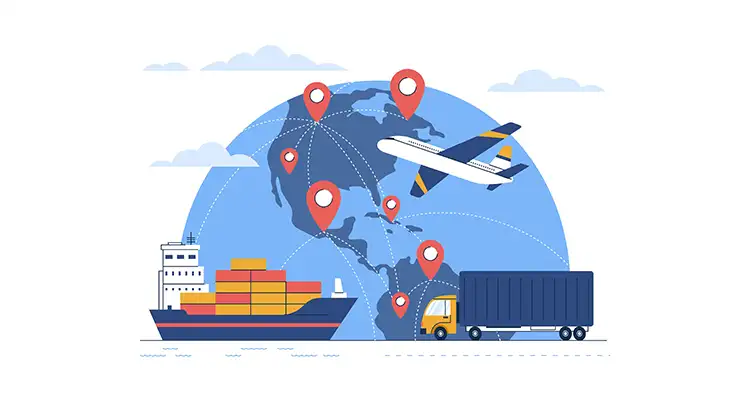
If you’re in the world of supply chain management, you’ve probably heard the buzzwords “AI” and “RPA” floating around. But what exactly do they mean, and what benefits do they bring when integrated into supply chain processes? Well, buckle up because we’re about to dive into the exciting world of AI and RPA integration in supply chain management, and trust me, the benefits are worth getting excited about!
In today’s fast-paced and ever-evolving business landscape, staying ahead of the competition is crucial. That’s where AI and RPA come in. AI, or Artificial Intelligence, refers to the simulation of human intelligence in machines that can analyze data, learn from it, and make informed decisions. RPA, or Robotic Process Automation, on the other hand, involves using software robots to automate repetitive tasks and streamline processes. When these two powerhouses join forces in supply chain management, the results are nothing short of transformative. From optimizing inventory management to enhancing forecasting accuracy, the benefits of AI and RPA integration are vast and game-changing. So, let’s explore the exciting ways in which this dynamic duo can revolutionize your supply chain operations and propel your business to new heights.
The Benefits of AI and RPA Integration in Supply Chain Management
Integrating Artificial Intelligence (AI) and Robotic Process Automation (RPA) in supply chain management can bring numerous advantages. AI algorithms can analyze vast amounts of data to optimize inventory management, demand forecasting, and route planning, leading to reduced costs and improved efficiency. RPA technology automates repetitive tasks, such as order processing and invoice reconciliation, freeing up time for employees to focus on more strategic activities. The combination of AI and RPA streamlines operations, enhances decision-making, and increases overall supply chain performance.

The Benefits of AI and RPA Integration in Supply Chain Management
Artificial Intelligence (AI) and Robotic Process Automation (RPA) have revolutionized various industries, and supply chain management is no exception. The integration of AI and RPA technologies in supply chain management brings numerous benefits that enhance efficiency, accuracy, and overall performance. In this article, we will explore the advantages of integrating AI and RPA into supply chain management processes, from inventory management to logistics and beyond.
Improved Inventory Management
AI and RPA integration in supply chain management streamlines inventory management processes, leading to improved accuracy and reduced costs. Through AI-powered algorithms, businesses can analyze historical data, current demand patterns, and market trends to predict future demand more accurately. This enables companies to optimize their inventory levels, ensuring they neither run out of stock nor hold excessive inventory.
Moreover, RPA technology automates inventory tracking and replenishment tasks, eliminating manual errors and saving time. By automating routine inventory management activities such as stock counting, order processing, and tracking shipments, businesses can minimize human intervention and enhance operational efficiency.
Enhanced Demand Forecasting
Accurate demand forecasting is crucial for supply chain management as it helps businesses optimize production, manage inventory levels, and meet customer demand effectively. AI and RPA integration enable companies to improve demand forecasting accuracy by leveraging advanced data analytics and machine learning algorithms.
AI algorithms analyze vast amounts of historical sales data, market trends, and external factors to identify patterns and predict future demand with greater precision. RPA technology automates data collection and processing, ensuring real-time updates and reducing the time and effort required for manual forecasting.
By leveraging AI and RPA in demand forecasting, businesses can make informed decisions, avoid stockouts or overstocking, and optimize their supply chain operations.
Streamlined Logistics and Transportation

Efficient logistics and transportation management are essential for a smooth supply chain. AI and RPA integration offer significant improvements in this aspect by optimizing route planning, reducing delivery times, and minimizing costs.
AI algorithms analyze various factors such as traffic conditions, weather forecasts, and historical data to determine the most efficient routes for transportation. This helps businesses minimize fuel consumption, reduce carbon emissions, and ensure timely deliveries.
RPA technology automates repetitive tasks in logistics, such as generating shipping labels, tracking orders, and updating shipment status. By eliminating manual interventions, companies can achieve faster order processing, reduce errors, and improve overall customer satisfaction.
Enhanced Supplier Relationship Management
Effective supplier relationship management is crucial for maintaining a reliable supply chain. AI and RPA integration provide tools and capabilities that facilitate efficient supplier management and collaboration.
AI-powered analytics can analyze supplier performance metrics, such as on-time delivery, quality, and cost, to identify the most reliable and cost-effective suppliers. This helps businesses make informed decisions when selecting and managing suppliers, ensuring a steady supply of high-quality goods or services.
RPA technology automates supplier communication, order processing, and invoicing, reducing manual errors and administrative overhead. By streamlining these processes, businesses can enhance communication, improve efficiency, and build stronger relationships with suppliers.
In conclusion, the integration of AI and RPA technologies in supply chain management offers numerous benefits, including improved inventory management, enhanced demand forecasting, streamlined logistics and transportation, and enhanced supplier relationship management. These advancements enable businesses to optimize their supply chain processes, reduce costs, improve customer satisfaction, and gain a competitive edge in the market. By embracing AI and RPA integration, companies can unlock the full potential of their supply chain and drive sustainable growth.
The Benefits of AI and RPA Integration in Supply Chain Management
- Improved Efficiency: AI and RPA integration streamline processes, reducing manual work and human error.
- Enhanced Visibility: By automating data collection and analysis, businesses gain real-time insights into their supply chain.
- Optimized Inventory Management: AI and RPA can predict demand patterns and optimize inventory levels, reducing costs and minimizing stockouts.
- Faster Decision Making: With AI and RPA, supply chain managers can access accurate and actionable information quickly, enabling faster decision-making.
- Increased Customer Satisfaction: By improving efficiency, visibility, and decision-making, AI and RPA integration ultimately leads to better customer experiences.
Frequently Asked Questions
What is AI and RPA integration in supply chain management?
AI and RPA integration in supply chain management refers to the incorporation of artificial intelligence (AI) and robotic process automation (RPA) technologies into the various aspects of supply chain operations. AI enables machines to simulate human intelligence and perform tasks such as data analysis, prediction, and decision-making. RPA, on the other hand, involves the use of software robots to automate repetitive and rule-based processes.
By integrating AI and RPA into supply chain management, organizations can streamline operations, improve efficiency, and make data-driven decisions to enhance overall performance and customer satisfaction.
What are the benefits of AI and RPA integration in supply chain management?
1. Enhanced Efficiency: AI and RPA technologies can automate routine tasks, reducing manual efforts and minimizing errors. This leads to improved efficiency and productivity in supply chain operations.
2. Accurate Demand Forecasting: AI algorithms can analyze large volumes of historical and real-time data to predict demand patterns accurately. This helps organizations optimize inventory levels, minimize stock-outs, and meet customer demands effectively.
3. Improved Decision-making: With AI-powered analytics, supply chain managers can access real-time insights and make data-driven decisions. AI algorithms can analyze vast amounts of data to identify trends, anomalies, and potential risks, enabling proactive decision-making.
4. Supply Chain Optimization: AI and RPA integration can optimize supply chain processes by identifying bottlenecks, improving inventory management, and enhancing logistics operations. This leads to cost savings, reduced lead times, and improved overall performance.
5. Enhanced Customer Experience: By leveraging AI and RPA technologies, organizations can provide faster order processing, accurate delivery estimates, and personalized customer interactions. This leads to improved customer satisfaction and loyalty.

How can AI and RPA integration be implemented in supply chain management?
Implementing AI and RPA integration in supply chain management involves several steps:
1. Assessing Needs: Identify areas in the supply chain where AI and RPA can bring maximum value. This could be demand forecasting, inventory management, logistics optimization, or customer service.
2. Data Collection and Integration: Gather relevant data from various sources such as ERP systems, sensors, and external databases. Clean and integrate the data to create a unified database for analysis.
3. AI and RPA Solution Selection: Evaluate different AI and RPA tools available in the market and select the ones that best fit your organization’s requirements and objectives.
4. Implementation and Integration: Deploy the chosen AI and RPA solutions into your existing supply chain management systems. Ensure seamless integration and compatibility with other technologies.
5. Training and Change Management: Provide training to employees on how to use and interact with AI and RPA technologies. Address any concerns or resistance to change through effective change management strategies.
6. Continuous Monitoring and Improvement: Regularly monitor the performance of AI and RPA solutions and make necessary adjustments to optimize their effectiveness. Keep up with the latest advancements in AI and RPA to stay ahead of the competition.
Are there any challenges in implementing AI and RPA integration in supply chain management?
While AI and RPA integration in supply chain management offers numerous benefits, there are some challenges that organizations may face:
1. Data Quality and Availability: AI and RPA systems heavily rely on accurate and reliable data. Ensuring data quality and availability can be a challenge, especially when dealing with disparate sources and legacy systems.
2. Integration Complexity: Integrating AI and RPA solutions with existing supply chain management systems can be complex and time-consuming. It requires careful planning, coordination, and technical expertise.
3. Workforce Adaptation: Employees may face resistance or fear of job displacement due to the integration of AI and RPA. Organizations need to address these concerns through effective change management and upskilling initiatives.
4. Cost Considerations: Implementing AI and RPA technologies can involve significant upfront costs, including software licenses, hardware infrastructure, and training. Organizations need to carefully assess the return on investment and long-term cost benefits.
5. Ethical and Legal Implications: The use of AI in supply chain management raises ethical and legal considerations, such as data privacy, algorithmic bias, and accountability. Organizations need to ensure compliance with relevant regulations and establish ethical guidelines.
Can AI and RPA completely replace human involvement in supply chain management?
No, AI and RPA cannot completely replace human involvement in supply chain management. While these technologies can automate repetitive tasks and provide valuable insights, human decision-making, creativity, and problem-solving skills are still crucial in managing complex supply chain operations.
AI and RPA should be seen as tools that augment human capabilities and enable more efficient and effective decision-making. Humans are needed to oversee and interpret the outputs of AI algorithms, make strategic decisions, handle exceptions, and build relationships with suppliers and customers. The successful integration of AI and RPA in supply chain management requires a balance between automation and human expertise.

Final Summary: The Game-Changing Benefits of AI and RPA Integration in Supply Chain Management
In this fast-paced world, where efficiency and accuracy are key, the integration of Artificial Intelligence (AI) and Robotic Process Automation (RPA) in supply chain management has proven to be a game-changer. As we conclude our exploration of the benefits of this integration, it’s clear that businesses that embrace these technologies are poised for success.
One of the most significant advantages of AI and RPA integration is the ability to streamline and automate various processes within the supply chain. By leveraging AI algorithms and machine learning, businesses can optimize inventory management, demand forecasting, and even route planning. This not only reduces human error but also enhances overall efficiency, leading to cost savings and improved customer satisfaction.
Furthermore, the integration of AI and RPA empowers businesses to make data-driven decisions. With real-time insights and analytics, supply chain managers can identify patterns and trends, allowing them to proactively address potential disruptions or bottlenecks. This level of foresight enables businesses to mitigate risks, increase agility, and ultimately gain a competitive edge in the market.
In conclusion, the integration of AI and RPA in supply chain management offers a multitude of benefits that can revolutionize the way businesses operate. From increased efficiency and accuracy to data-driven decision-making, these technologies have the potential to transform supply chains into seamless and agile systems. By embracing the power of AI and RPA, businesses can position themselves at the forefront of innovation and drive sustainable growth in the dynamic landscape of supply chain management. So, don’t miss out on the opportunity to harness these game-changing benefits and propel your business towards success.


